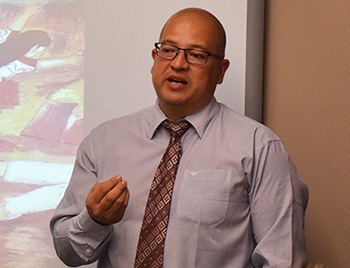
Fredy Peccerelli
Fredy Peccerelli grew up like any other boy in Brooklyn: he played baseball, went to school, and graduated from college. But his family’s history was anything but average.
His father, a lawyer, was on the Guatemalan weightlifting team at the 1980 Moscow Olympics – a time of intense civil war in Guatemala, when “death squads” were killing thousands of civilians. When he returned from the Olympics, someone accused him of being a communist, and members of the death squads began threatening to kill him.
Peccerelli’s father went into hiding and then fled to New York, where the rest of the family joined him. Peccerelli was nine years old. But once he adjusted to his new life in America, he rarely showed an interest in the turmoil of his family’s homeland.
“I really didn’t know what was happening in Guatemala. I didn’t care for it; it was too painful,” Peccerelli said in a TED talk in November 2014.
That all changed in college, when Peccerelli studied anthropology and archaeology. He met two leaders of the field of forensic anthropology, Dr. Clyde Snow and Dr. Karen Burns, and offered his help in their work exhuming mass graves in Guatemala.
Just a few years later, in 1997, he helped found the Fundación de Antropología Forense de Guatemala (FAFG). FAFG is a not for profit organization that carries out forensic examinations into killings during the Guatemalan civil war and genocide in the second half of the 20th century. FAFG has over 2,000 cases under investigation and works nationally with families and communities requesting forensic investigations to establish the place of mass graves, family member identification, and as a part of criminal investigations.
Peccerelli is currently director of FAFG. To date, he and his team have recovered thousands of sets of remains and reunited them with their families. They have discovered hundreds of mass graves that offer proof that a genocide occurred and have provided forensic evidence to the Guatemalan Justice System and Public Prosecutor’s Office in 1,400 anthropological experts’ reports related to legal cases of the conflict.
The new partnership with USC Shoah Foundation, in which FAFG will collect and record testimonies of Guatemalan genocide survivors that will then be preserved in the Visual History Archive, provides an opportunity for survivors and witnesses to share their stories for the first time, Peccerelli said.
“Until we approached many of these families to fill out surveys for our fieldwork, no authority had ever asked them about the horrors they’d witnessed, so there has been a real hunger on their part to break the silence,” he said.
Through his work at FAFG, Peccerelli is motivated to obtain justice for the victims and their families, and to shine a light on some of the least-studied, most obscured mass atrocities in recent history.
“This is happening everywhere and we can’t let it go on anymore,” he said at TED. “We have to now come together and decide that we are not going to have any more missing.”